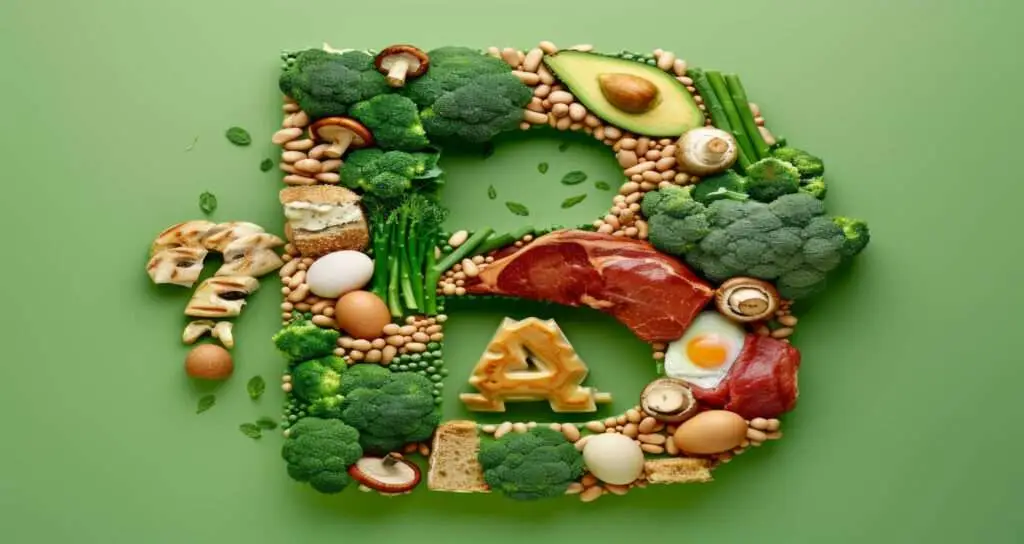Vitamin B benefits deficiency symptoms are commonly linked to low energy levels, nerve problems, anemia, and poor overall health. Vitamin B is a group of essential nutrients required for daily body functions.
Vitamin B is a group of essential nutrients that play a crucial role in energy production, nerve function, red blood cell formation, and overall health. A deficiency of vitamin B can lead to fatigue, nerve problems, anemia, and other health complications. This guide explains vitamin B benefits, food sources, deficiency symptoms, health risks, and who may need supplementation.
Table of Contents
What Is Vitamin B?
Vitamin B is not a single vitamin but a group of eight water-soluble vitamins, collectively called the Vitamin B-Complex. These vitamins help the body convert food into energy and support the nervous system, brain function, skin, and blood health.
Types of Vitamin B
- Vitamin B1 (Thiamine) – energy metabolism, nerve health
- Vitamin B2 (Riboflavin) – cell growth, antioxidant support
- Vitamin B3 (Niacin) – cholesterol balance, skin health
- Vitamin B5 (Pantothenic Acid) – hormone production
- Vitamin B6 (Pyridoxine) – brain development, immunity
- Vitamin B7 (Biotin) – hair, skin, and nail health
- Vitamin B9 (Folate) – red blood cells, pregnancy health
- Vitamin B12 (Cobalamin) – nerve function, DNA formation

If you are new to nutrition, start with our pillar article explaining
what are vitamins and how they work
before exploring individual vitamin benefits.
Key Vitamin B Benefits and Deficiency Effects
1. Supports Energy Production
Vitamin B helps convert carbohydrates, fats, and proteins into usable energy. Low levels can cause tiredness, weakness, and low stamina.
2. Maintains Nervous System Health
Vitamins B1, B6, and B12 are especially important for nerve function. Adequate intake supports proper nerve signaling and brain health.
3. Helps Prevent Anemia
Vitamin B9 (folate) and B12 are required for red blood cell formation. Deficiency can lead to megaloblastic anemia, causing fatigue and breathlessness.
4. Supports Brain Function and Mood
Vitamin B6, B9, and B12 help regulate neurotransmitters like serotonin and dopamine, which influence mood, memory, and concentration.
5. Promotes Healthy Skin, Hair, and Nails
Biotin (B7) and riboflavin (B2) support healthy skin, reduce dryness, and strengthen hair and nails.
6. Supports Heart Health
Vitamin B6, B9, and B12 help regulate homocysteine levels. High homocysteine is associated with increased heart disease risk.
Vitamin B Food Sources
Vitamin B is found naturally in many foods:
Animal Sources
- Eggs
- Milk and dairy products
- Fish and seafood
- Poultry
- Red meat
Plant Sources
- Whole grains
- Brown rice
- Legumes (beans, lentils)
- Nuts and seeds
- Leafy green vegetables
- Bananas
👉 Vegetarians and vegans should pay special attention to Vitamin B12, as it is mainly found in animal foods.
Vitamin B Benefits Deficiency Symptoms Explained
Vitamin B deficiency symptoms vary depending on the specific vitamin lacking.
Common Symptoms
- Fatigue and weakness
- Tingling or numbness in hands and feet
- Pale skin
- Mouth ulcers
- Poor concentration
- Mood changes
Severe Deficiency Symptoms
- Nerve damage
- Memory problems
- Depression
- Anemia
- Difficulty walking
Causes of Vitamin B Deficiency
Vitamin B deficiency may occur due to:
- Poor diet
- Alcohol consumption
- Digestive disorders (IBS, Crohn’s disease)
- Long-term medication use
- Vegetarian or vegan diet (B12 risk)
- Aging
Health Risks of Untreated Vitamin B Deficiency
If left untreated, vitamin B deficiency may increase the risk of:
- Permanent nerve damage
- Heart disease
- Cognitive decline
- Pregnancy complications
- Weakened immunity
Early detection and correction are important.
You may also read our detailed guides on
Vitamin D benefits
and
how vitamins work in the body.
Who Is at Higher Risk of Vitamin B Deficiency?
People at higher risk include:
- Older adults
- Pregnant women
- People with digestive disorders
- Vegans and vegetarians
- Individuals with chronic illnesses
- People taking acid-reducing medications
Vitamin B Supplements: When Are They Needed?
Vitamin B supplements may be recommended when dietary intake is insufficient or absorption is poor.
Common Supplement Forms
- Vitamin B-Complex tablets
- Individual B-vitamin supplements
- Injectable Vitamin B12 (medical supervision)
👉 Supplements should be taken only under medical guidance for long-term use.
According to the National Institutes of Health (NIH), vitamin B deficiencies can affect energy metabolism, nerve function, and blood health.
Recommended Daily Intake (General Guidance)
| Vitamin | Approximate Daily Requirement |
|---|---|
| B1 | 1.1–1.2 mg |
| B2 | 1.1–1.3 mg |
| B6 | 1.3–1.7 mg |
| B9 | 400 mcg |
| B12 | 2.4 mcg |
Requirements may vary based on age, gender, and health status.
Vitamin B Excess: Can You Take Too Much?
Although vitamin B is water-soluble, excessive supplementation may cause:
- Nausea
- Headache
- Nerve irritation (high B6)
- Skin flushing (niacin)
Avoid self-medication with high doses.
Frequently Asked Questions (FAQs)
Is vitamin B good for daily use?
Yes, when taken within recommended limits through diet or supplements.
Can vitamin B help with fatigue?
Yes, especially if fatigue is due to deficiency.
Is vitamin B safe for kidney patients?
Some forms may require caution. Always consult a doctor.
Do vitamin B supplements improve hair growth?
Biotin may help if deficiency exists, but results vary.
Conclusion
Vitamin B plays a vital role in maintaining energy levels, nerve health, blood formation, and overall wellness. A balanced diet rich in natural sources usually provides adequate vitamin B, but some individuals may require supplementation due to deficiency or absorption issues.
Early recognition of symptoms and proper medical guidance can help prevent long-term health complications.
🔒 Medical Disclaimer
This article is for informational purposes only and does not substitute professional medical advice. Consult a qualified healthcare provider before starting any vitamin supplement.


1 thought on “Vitamin B Benefits, Sources, Deficiency Symptoms, and Health Risks”